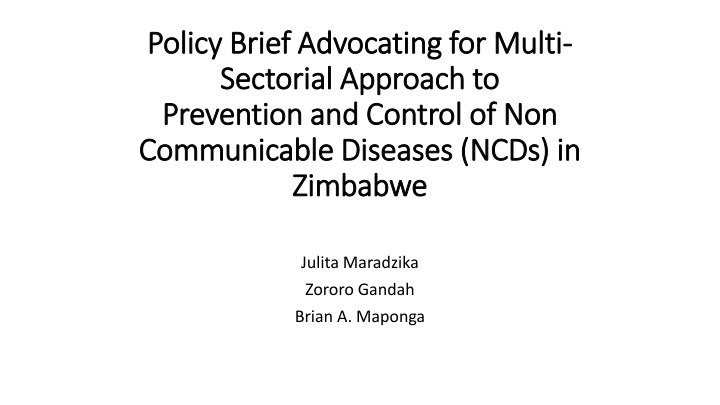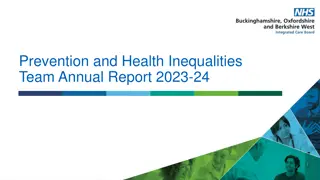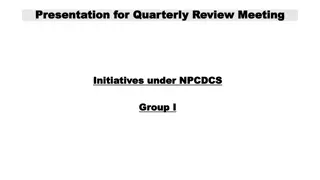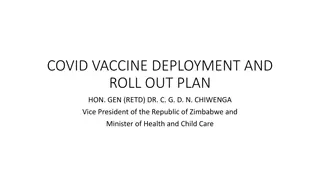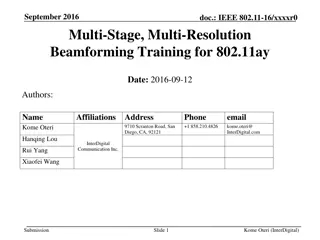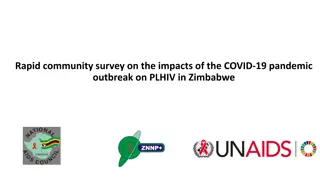Advocating for Multi-Sectorial Approach to NCD Prevention and Control in Zimbabwe
Zimbabwe faces a triple burden of diseases with a significant impact of non-communicable diseases (NCDs). The current policy approach on NCDs needs to change due to the increasing healthcare demands, rise in health expenditure, and implications on national budget and social protection. Key recommendations include conducting a gap analysis, community empowerment, and developing effective prevention strategies.
Download Presentation

Please find below an Image/Link to download the presentation.
The content on the website is provided AS IS for your information and personal use only. It may not be sold, licensed, or shared on other websites without obtaining consent from the author.If you encounter any issues during the download, it is possible that the publisher has removed the file from their server.
You are allowed to download the files provided on this website for personal or commercial use, subject to the condition that they are used lawfully. All files are the property of their respective owners.
The content on the website is provided AS IS for your information and personal use only. It may not be sold, licensed, or shared on other websites without obtaining consent from the author.
E N D
Presentation Transcript
Policy Brief Advocating for Multi Policy Brief Advocating for Multi- - Sectorial Approach to Sectorial Approach to Prevention and Control of Non Prevention and Control of Non Communicable Diseases (NCDs) in Communicable Diseases (NCDs) in Zimbabwe Zimbabwe Julita Maradzika Zororo Gandah Brian A. Maponga
Context of the Problem Context of the Problem Zimbabwe experiencing an epidemiological transition faced by a triple burden of communicable, re-emerging and non-communicable diseases The country has put a lot of emphasis and resources on the first two Non-communicable diseases (NCDs), which include cardiovascular disease, cancer, diabetes mellitus are all associated with the common risk factors such as poor diet, insufficient physical activity, tobacco use, and alcohol abuse. NCDs caused 63% of all deaths globally in 2008 with more than 80% occurring in developing countries. It is estimated that NCDs account for 31% of the total deaths in Zimbabwe (WDI 2012).
Why policy approach argues for the current Why policy approach argues for the current approach/policy to be changed approach/policy to be changed Impact of NCDs on the Health sector Increased demand for NCD healthcare Health response to NCD will increase manpower needs in health facilities and in the community. Constant supply of medication is required to respond to NCDs Rehabilitation services will be required to respond to the needs of stroke patients in hospital and out of hospital so as to rehabilitate them back into society.
Why policy approach argues for the current Why policy approach argues for the current approach/policy to be changed approach/policy to be changed Impact of NCDs to other sectors The chronic nature of the NCDs has seen the cost of per capita health expenditure rising to above $86 per annum. This has a direct bearing on the national budget, as the total health expenditure will have to be increased. Considering the current economic challenges, it means the funding has to be drawn from support of other public goods; Non communicable diseases are increasingly becoming a threat to the life of individuals and community. There is an increase in orphans and disabled adults who will require social protection, a further national budgetary strain The chronic nature of NCDs results in loss of family income, and productive time
Key recommendations for action Key recommendations for action Conduct a situation analysis to identify gaps and develop evidence to be addressed in the strategy Develop or use existing structures to inform educate and empower the community on the importance of NCD prevention Build capacities of all sectors to understand their role in NCD prevention Create a forum for decision making between industry and health sector in marketing and selling of food , alcohol ,drugs and other detrimental factors to individual health Develop guidelines for the management of NCD that will be used as reference by all sectors Develop a conducive environment for the prevention promotion of NCDs at all levels
Key Stakeholders and Negotiation Key Stakeholders and Negotiation Key Stakeholders Government Departments: Local Government; Agriculture; Industry and Commerce; Education; Transport and Energy; Community Development; Social Services; Sports and Recreation Commission Food processing industry Local Non Governmental: Pharmaceutical Companies; Cancer Association; Rehabilitation centers; Hospice; Community Based Organizations; Diabetic Association; Professional Health Associations (e.g. ZiPHA); Community and Faith Based Organizations International organizations: governmental; non governmental; multilateral Negotiation Platforms SDH committee Zimbabwe Public Health Associations Social Services Cluster Provincial, district, ward and village development committes Parliamentary Committee on Health Community groupings Industry associations
Discuss use of evidence and general strategies used Discuss use of evidence and general strategies used to communicate/translate the evidence to policy to communicate/translate the evidence to policy Information obtained from the situation analysis will provide evidence that will be packed in a simple and clear format to communicate the importance of NCDs to all stakeholders who will contribute towards the development of the policy on NCD
Strength and weaknesses of the policy brief Strength and weaknesses of the policy brief Strengths The National Health strategy 2016-2020 has provided a strong argument to support the need to address NCD and to have in place an NCD strategy The formulation of the current strategy has already used a wide consultative process which included all the stakeholder who are key in the implementation of the NCD strategy Weaknesses Currently there is no budget to support the planned activities Implementation of this strategy will require the participation and commitment of resources from other sectors further agreement on the cost will be required
Final decision taken on NCDs Final decision taken on NCDs A strategy is required since there is evidence of an increase in the contribution of NCDs to the burden of diseases double burden of both communicable and non communicable Ratification of the Tobacco control Convention UN organizations expect the country to have an NCD strategy in place
THANK YOU THANK YOU
